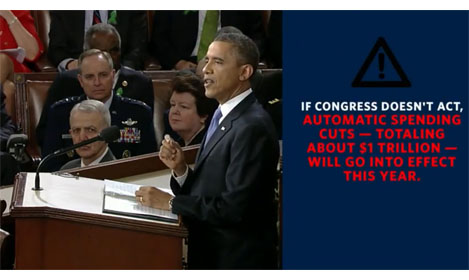NATIONAL
How sequestration will affect Washington
The following information is provided by the White House. (For a printable version that also includes the nationwide impacts, download this PDF):
Impact of March 1st Cuts on Middle Class Families, Jobs and Economic Security: Washington State
 (Feb. 25, 2013) — Unless Congress acts by this FridaY, March 1, a series of automatic cuts — called the sequester — will take effect that threaten hundreds of thousands of middle-class jobs, and cut vital services for children, seniors, people with mental illness and our men and women in uniform.
(Feb. 25, 2013) — Unless Congress acts by this FridaY, March 1, a series of automatic cuts — called the sequester — will take effect that threaten hundreds of thousands of middle-class jobs, and cut vital services for children, seniors, people with mental illness and our men and women in uniform.
There is no question that we need to cut the deficit, but the President believes it should be done in a balanced way that protects investments that the middle class relies on. Already, the President has worked with Congress to reduce the deficit by more than $2.5 trillion, but there’s more to do. The President has put forward a balanced plan to not only avoid the harmful effects of the sequester but also to reduce the deficit by more than $4 trillion in total. The President’s plan meets Republicans more than halfway and includes twice as many spending cuts as it does tax revenue from the wealthy.
Unfortunately, many Republicans in Congress refuse to ask the wealthy to pay a little more by closing tax loopholes so that we can protect investments that are helping grow our economy and keep our country safe. By not asking the wealthy to pay a little more, Republicans are forcing our children, seniors, troops, military families and the entire middle class to bear the burden of deficit reduction. The President is determined to cut spending and reduce the deficit in a balanced way, but he won’t stick the middle class with the bill. The President is willing to compromise, but on behalf the middle class he cannot accept a deal that undercuts their economic security.
Our economy is continuing to strengthen but we cannot afford a self-inflicted wound from Washington, D.C. Republicans should compromise and meet the President in the middle. We cannot simply cut our way to prosperity, and if Republicans continue to insist on an unreasonable, cuts-only approach, Washington State risks paying the price.
WASHINGTON STATE IMPACTS
 If sequestration were to take effect, some examples of the impacts on Washington this year alone are:
If sequestration were to take effect, some examples of the impacts on Washington this year alone are:
— Teachers and Schools: Washington will lose approximately $11,606,000 in funding for primary and secondary education, putting around 160 teacher and aide jobs at risk. In addition about 11,000 fewer students would be served and approximately 50 fewer schools would receive funding.
Education for Children with Disabilities: In addition, Washington will lose approximately $11,251,000 in funds for about 140 teachers, aides, and staff who help children with disabilities.
— Work-Study Jobs: Around 440 fewer low income students in Washington would receive aid to help them finance the costs of college and around 180 fewer students will get work-study jobs that help them pay for college.
— Head Start: Head Start and Early Head Start services would be eliminated for approximately 1,000 children in Washington, reducing access to critical early education.
— Protections for Clean Air and Clean Water: Washington would lose about $3,301,000 in environmental funding to ensure clean water and air quality, as well as prevent pollution from pesticides and hazardous waste. In addition, Washington could lose another $924,000 in grants for fish and wildlife protection.
— Military Readiness: In Washington, approximately 29,000 civilian Department of Defense employees would be furloughed, reducing gross pay by around $173.4 million in total.
Army: Base operation funding would be cut by about $124 million in Washington.
Air Force: Funding for Air Force operations in Washington would be cut by about $3 million.
Navy: Cancel aircraft depot maintenance at Whidbey Island, a demolition project in Bremerton.
— Law Enforcement and Public Safety Funds for Crime Prevention and Prosecution: Washington will lose about $271,000 in Justice Assistance Grants that support law enforcement, prosecution and courts, crime prevention and education, corrections and community corrections, drug treatment and enforcement, and crime victim and witness initiatives.
— Job Search Assistance to Help those in Washington find Employment and Training: Washington will lose about $661,000 in funding for job search assistance, referral, and placement, meaning around 24,510 fewer people will get the help and skills they need to find employment.
— Child Care: Up to 800 disadvantaged and vulnerable children could lose access to child care, which is also essential for working parents to hold down a job.
— Vaccines for Children: In Washington around 2,850 fewer children will receive vaccines for diseases such as measles, mumps, rubella, tetanus, whooping cough, influenza, and Hepatitis B due to reduced funding for vaccinations of about $195,000.
— Public Health: Washington will lose approximately $642,000 in funds to help upgrade its ability to respond to public health threats including infectious diseases, natural disasters, and biological, chemical, nuclear, and radiological events. In addition, Washington will lose about $1,740,000 in grants to help prevent and treat substance abuse, resulting in around 3800 fewer admissions to substance abuse programs. And the Washington State Department of Health will lose about $174,000 resulting in around 4,300 fewer HIV tests.
— STOP Violence Against Women Program: Washington could lose up to $143,000 in funds that provide services to victims of domestic violence, resulting in up to 500 fewer victims being served.
— Nutrition Assistance for Seniors: Washington would lose approximately $1,053,000 in funds that provide meals for seniors.





